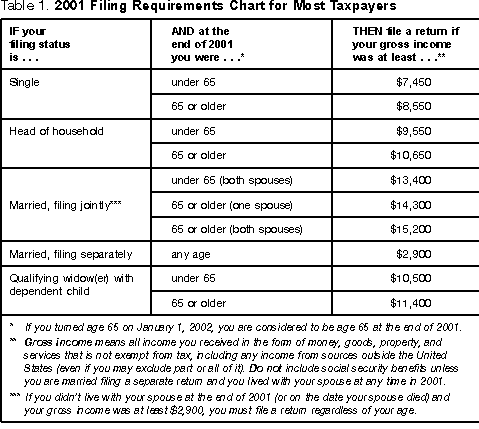This publication discusses some tax rules that affect every person
who may have to file a federal income tax return. It answers some
basic questions: who must file; who should file; what filing status to
use; how many exemptions to claim; and the amount of the standard
deduction.
The first section of this publication explains who must file
an income tax return. If you have little or no gross income, reading
this section will help you decide if you have to file a return.

The second section is about who should file a return.
Reading this section will help you decide if you should file a return,
even if you are not required to do so.
The third section helps you determine which filing status
to use. Filing status is important in determining whether you must
file a return, your standard deduction, and your tax rate. It also
helps determine what credits you may be entitled to.
The fourth section discusses exemptions, which reduce
your taxable income. The discussions include the social security
number requirement for dependents, the rules for multiple
support agreements, and the rules for divorced or separated parents.
The fifth section gives the rules and dollar amounts for the
standard deduction -- a benefit for taxpayers who do
not itemize their deductions. This section also discusses the standard
deduction for taxpayers who are blind or age 65 or older, and special
rules for dependents. In addition, this section should help you decide
whether you would be better off taking the standard deduction or
itemizing your deductions.
The last section explains how to get tax help from the IRS.
This publication is for U.S. citizens and resident aliens only. If
you are a resident alien for the entire year, you must follow the same
tax rules that apply to U.S. citizens. The rules to determine if you
are a resident or nonresident alien are discussed in chapter 1 of
Publication 519,
U.S. Tax Guide for Aliens.
Nonresident aliens.
If you were a nonresident alien at any time during the year, the
rules and tax forms that apply to you may be different from those that
apply to U.S. citizens. See Publication 519.
Comments and suggestions.
We welcome your comments about this publication and your
suggestions for future editions.
You can e-mail us while visiting our web site at
www.irs.gov.
You can write to us at the following address:
Internal Revenue Service
Technical Publications Branch
W:CAR:MP:FP:P
1111 Constitution Ave. NW
Washington, DC 20224
We respond to many letters by telephone. Therefore, it would be
helpful if you would include your daytime phone number, including the
area code, in your correspondence.
First | Next
Publication Index | 2001 Tax Help Archives | Tax Help Archives | Home
